Christian Democratic Union of Germany
![]()
CDU is a redirect to this article. For other meanings, see CDU (disambiguation).
The Christian Democratic Union of Germany (abbreviation: CDU) is a Christian Democratic, conservative and economically liberal party in Germany, which is located in the center-right political spectrum.
Together with its sister party, the Christian Social Union (CSU), Germany's second largest party by members is also known as the Union. The CDU stands for election in all federal states except Bavaria, the CSU in turn only there. Both parties form a parliamentary group in the Bundestag, the CDU/CSU parliamentary group.
The CDU was founded after the Second World War as an interdenominational Christian party, in contrast to the Catholic-oriented Centre Party. Its ideological roots are the Catholic social doctrine, conservatism and ordoliberalism.
At the federal level, the CDU/CSU has been in government longer than any other German party since the founding of the Federal Republic. For the longest time, the CDU formed coalitions with the CSU and the FDP in black-yellow coalitions. In 1969-1982 and 1998-2005, the CDU/CSU led the parliamentary opposition. Since 2005, the CDU has again provided the Federal Chancellor in the person of Angela Merkel. In the 2017 federal election, the CDU became the strongest political force for the third time in a row. Together with the CSU and SPD, it is part of the Grand Coalition and thus supports the Federal Government (Merkel Cabinet IV).
The CDU is also represented in the state parliaments of all the federal states in which it is a candidate. Currently, it participates in the respective state government in nine states, in six of them it provides the minister president.
Alongside the SPD on the left, the conservative CDU is regarded as one of the two great people's parties in post-war history. In the increasingly fragmented party landscape of the Berlin Republic, this position is partly being called into question.
Profile
Tradition
Since its foundation, the CDU has been open to people of all Christian denominations and also to non-Christians. The fact that the CDU explicitly calls itself Christian is based on the party's decision to declare itself explicitly committed to the Christian image of man. When the party was founded in 1945, overcoming the political antagonism between Catholics and Protestants was also a main motive for including the adjective "Christian" in the party name. The CDU is often referred to as a successor to the Catholic-oriented Centre Party. It sees itself as a party of the middle with an offer for the entire population.
"According to the Christian understanding, man, nature and the environment are God's creation," states the CDU's basic programme from 2007. God created man in his image, from which the dignity of man is derived as an asset worthy of protection. The natural environment is seen as a creation that man is not allowed to dispose of freely, but which has been entrusted to him by God for preservation.
The CDU is committed to anchoring the reference to God in the Charter of the European Union, to preserving Christian symbols in public spaces and to maintaining Christian holidays.
With political statements of the two large churches similarities (for instance with regard to the social policy oriented to the Christian social doctrine or the rejection of euthanasia) as well as differences can be found, e.g. with regard to the attitude to biotechnology, in particular genome research, or in questions of the right of asylum.
Policy Statements
The following basic programmes have been adopted by the CDU in the past:
- Neheim-Hüstener Programm (1946), shows the conflict about a "Christian socialism
- Düsseldorfer Leitsätze (1949), adopted on the occasion of the 1949 federal election, advocates a social market economy
- Hamburg Programme (1953)
- Berlin Programme (1968 (first version), 1971 (second version))
- Ludwigshafen Programme (1978)
- Freedom in Responsibility (1994)
- Freedom and Security. Principles for Germany (2007): In 2006, the CDU initiated a debate on a new basic programme under the motto "New justice through more freedom". All of the CDU's state associations and federations were represented on the 69-member Principles Commission, which met for the first time on 25 April 2006 under the chairmanship of the then CDU Secretary-General Ronald Pofalla. The draft produced by this commission was approved by the CDU federal executive committee in early July 2007 and finally adopted at the federal party conference in Hanover on 3 December 2007.
Since autumn 2018, work has been underway within the CDU on a new basic programme.
Program
Basic orientation
Since its foundation, the CDU has invoked a Christian image of man. According to the Neheim-Hüsten Programme of 1946, the "high conception of Christianity of human dignity, of the value of each individual human being should apply as a basis and guideline (...) in political, economic and cultural life", which should be reflected, among other things, in the "right to political and religious freedom", in "legal security for everyone", in the free activity of women and in the protection of minorities. According to the preamble of the basic programme of 2007, the CDU is also oriented "towards the Christian image of man and his inviolable dignity and, based on this, towards the basic values of freedom, solidarity and justice".
Economic policy
The CDU is committed to the social market economy and sees it as a guarantor of freedom, prosperity and security in the future. In the course of globalization, it strives for an international expansion of the social market economy, whereby the economic freedom gained should serve the people. Overall, the CDU is concerned with an "economically reasonable and socially just" policy.
Furthermore, the CDU sees the social market economy at the same time as a model of society directly linked to a "liberal democracy". According to its principle, freedom and responsibility as well as competition and solidarity form a unity that makes the economic and social model social and ensures social justice. The strength of the social market economy is based on "more freedom and competition". The CDU trusted in the "positive power of free markets and fair competition".
The aim of the economic policy is full employment of the population, a steady and adequate economic growth as well as a solid budget. Furthermore, the CDU strives for a privatization of all economic enterprises that are currently still state-owned. In labor policy, the CDU is committed to "making the labor market more flexible" and to collective bargaining autonomy. Unemployment is to be counteracted.
According to the CDU, the debt level of public budgets must be decisively reduced, whereby "today's debts [...] are tomorrow's taxes". Public investments should only be financed "through loans that create value or assets".
Family policy
The CDU introduced the child-raising allowance (Erziehungsgeld) and parental allowance (Elterngeld) to support families. Furthermore, a legal entitlement to a daycare place was introduced in 1996 and to a crèche place in 2013 under the respective CDU governments. The expansion of kindergarten places is to be further strengthened by the government until 2021. No particular family model is prescribed for families.
During the 18th Bundestag, same-sexmarriage was also passed with about a third of the CDU/CSU deputies' votes, after Chancellor Merkel had called the vote a matter of conscience without factional constraint. The vote was then scheduled at short notice in the last session week of the legislative period by the other parliamentary groups in the Bundestag against the will of the CDU/CSU parliamentary group. In the years before, the equality of homosexual partnerships, for example in terms of tax law, was not proactively pushed by the majority of the party; progressive laws usually came about through compromises with coalition partners with a more liberal attitude or under pressure from rulings of the highest courts.
Education policy
The CDU held on to the tripartite school system longer than other parties. It only openly abandoned it in 2011.
From 2008 to 2013, tuition fees were advocated.
Internal security
During the 2017 election campaign, the CDU campaigned for more police officers and stronger security of the EU's external borders. According to the CDU/CSU parliamentary group, it should be possible to authorise the deployment of the Bundeswehr at home in the event of "a particularly serious terrorist situation [...] under the leadership of the police".
Net Policy
In the area of network policy, the CDU advocates greater regulation and monitoring of the Internet and supports data retention, which it has called the "minimum retention period" since July 2013. It also advocates blocking internet content and online searches.
As part of the Group of the European People's Party (EPP), the CDU was instrumental in drafting EU Directive 2019/790 on copyright reform in the Digital Single Market.
Immigration policy
With regard to foreigners policy, the CDU expects greater efforts from immigrants for more integration, advocates the promotion of the German language among immigrants and advocates a controlled immigration policy. A holistic immigration law with a points system is frequently discussed by the party. Dual citizenship is only advocated in exceptional cases. In 1998/1999, the CDU, together with the CSU, organized a signature campaign against dual citizenship. The Union favours the expulsion of criminal foreigners.
Foreign Policy
In terms of foreign policy, it seeks above all an intact relationship with the USA. Thus, in the context of the Iraq war, it frequently accused the then Red-Green federal government of anti-Americanism. According to former chancellor candidate Edmund Stoiber (CSU), an "ominous axis" Paris-Berlin-Moscow-Beijing could never replace integration into the Western alliance. Germany rather needs the USA as guarantor of peace and freedom in the world. Furthermore, the CDU/CSU parliamentary group declared that it would always stand in solidarity with Israel.
European policy
The CDU sees itself as "the" European party. This claim is justified by the European policy of Konrad Adenauer and subsequent chancellors of the party, as well as a tradition that programmatically aimed at a European federal state and the unification of the Christian West. However, the idea of a federal state has increasingly receded into the background with the introduction of internal market regulation and German reunification.
Former Chancellor Helmut Kohl still plays a special role in the European orientation of the CDU. He is described within the party (but also beyond party and national borders) as a convinced European, since European integration was advanced during his chancellorship, for example through the conclusion of treaties on the euro, the internal market or Schengen.
In the wake of the euro crisis the CDU is repositioning itself on European integration, but less critically than its Bavarian sister party the CSU. MEPs of the party advocate a further development of the European Union into a European Confederation. The CDU-led federal government under Angela Merkel did place greater emphasis on intergovernmental arrangements from 2009 onwards, for example in the context of the Euro Plus Pact or the emphasis on a "Union method". At its 2011 Leipzig Party Congress in Berlin, however, the CDU adopted a position propagating the community method and calling for a political union based on federal principles.
It considers Turkey's full membership of the EU to be wrong. Instead, the party advocates a privileged partnership. It argues above all that Turkey frequently violates human rights and that the Turkish government still denies the Armenian genocide of 1915. Furthermore, Turkey must recognise Cyprus as a sovereign state, as it is a basic requirement that EU members recognise each other. The CDU complained that the question of whether Turkey would join the EU could become automatic if Turkey were offered EU accession negotiations at this point in time.
Party Politics
Coalitions
The preferred coalition partner at the federal level has so far generally been the FDP, as the CDU sees the most common ground with it above all in economic and tax policy. There are differences of opinion above all on the issue of civil rights; in particular, the expansion of video surveillance advocated by the CDU but vehemently opposed by the FDP, as well as the longer-term storage of connection data, should be mentioned in this context. If the possibility of a black-yellow coalition failed to materialise, a black-red coalition with the SPD was generally formed for the respective legislative period.
At state level, alongside the SPD, Bündnis 90/Die Grünen are currently the CDU's most frequent coalition partners - in six states in each case. For the first time, a black-green coalition governed in Hamburg from May 2008 to November 2010. Since January 2014, Hesse has been governed jointly by the CDU and the Greens, while in Baden-Württemberg the CDU has been the Greens' "junior partner" since 2016. A so-called Jamaica coalition, together with the Greens and the FDP, existed for the first time in Saarland from November 2009 to January 2012, and has existed in Schleswig-Holstein since 2017. A so-called Kenya coalition, with SPD and Greens, governs under the leadership of the CDU in Saxony-Anhalt and Saxony, under the leadership of the SPD in Brandenburg. In addition, at state level there are two red-black (Lower Saxony and Mecklenburg-Western Pomerania), one black-red (Saarland) and one black-yellow coalition (North Rhine-Westphalia). At the municipal level, there are coalitions with the Greens, especially in large cities such as Cologne, Frankfurt am Main, Kiel or Saarbrücken.
Relationship with the CSU
→ Main article: Union (politics)
The CDU and CSU emerged after the Second World War as collective movements oriented towards the guiding principle of the Christian image of man. Initially, groups joined together on a decentralized basis - the focal points were Cologne, Berlin and Munich - hence the term "Union" and not "party". It was not until 1950, i.e. after the election of Konrad Adenauer as the first Federal Chancellor, that the CDU met for its first federal party conference. The Union in Bavaria left it at the state level, but made it clear early on that the CSU wanted to be a party with a federal political focus and to form a unit with the CDU at the federal level. The two Union parties form a joint parliamentary group in the Bundestag.
However, the relationship between the CDU and the CSU was not always unproblematic. In the past, there were sometimes heated disputes, culminating in the Kreuth separation resolution, which was ultimately not implemented.
Sometimes there are strong disagreements and rarely hostilities between the two parties, as most recently in the political debate on the refugee crisis in Germany from 2015, where CDU leader Angela Merkel coined the phrase "We can do it", but CSU leader Horst Seehofer instead demanded that the CDU agree to an upper limit for refugees. For the first time in years, Angela Merkel did not attend the 2016 CSU party conference as a speaker in her capacity as CDU leader.
Women's quota
On 8 July 2020, the CDU's Structure and Statutes Commission agreed on a proposal for a women's quota for party offices and candidates for mandates. This quota model gradually prescribes a minimum proportion of women in executive committees from the district level onwards from 2021. Initially, a 30 percent quota would apply, from 2023 40 percent and from 2025 one of 50 percent would be mandatory. On October 5, the CDU federal executive board will discuss the results of the commission.
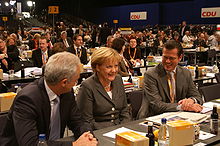
Angela Merkel between the CSU politicians Ramsauer (left) and zu Guttenberg, 2008
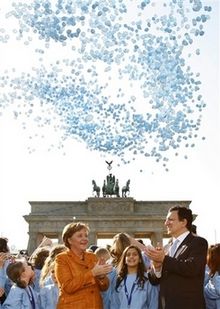
Angela Merkel and the former President of the European Commission José Manuel Barroso in front of the Brandenburg Gate
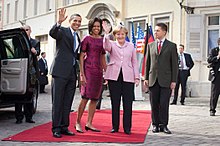
Angela Merkel and US President Barack Obama at the state reception in Baden-Baden, 3 April 2009
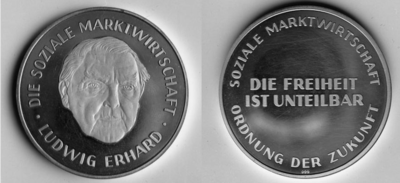
Commemorative Medal Ludwig Erhard - The Social Market Economy
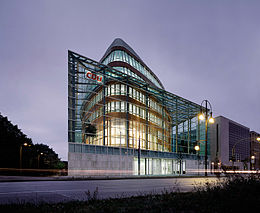
The Konrad Adenauer House in Berlin
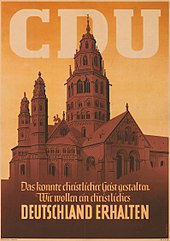
Election poster for the federal election 1949
Branches and factions
Levels
The CDU of Germany is divided into 17 state associations, 27 district associations, 327 district associations and over 10,000 local associations. It is organized in state associations in all German states except Bavaria. In Lower Saxony, for historical reasons, there are three regional associations: Hanover, Brunswick and Oldenburg; together they form the regional CDU association in Lower Saxony.
National Associations
The CDU is represented in all the state parliaments for which it is a candidate, in faction strength. It currently provides six out of sixteen minister presidents, in Bavaria the sister party CSU governs. Furthermore, the CDU participates in other state governments in Baden-Württemberg as a smaller coalition partner of Alliance 90/The Greens, in Mecklenburg-Western Pomerania and Lower Saxony as a junior partner of the SPD.
| State association | Chairman | Members | Members per inhabitant aged 16 and over (as at 31 December 2017) | Result of the Bundestag election 2017 | Last election result state parliament | CDU head of government | |
|
| Baden-Württemberg | Thomas Strobl | 61.470 | 0,68 % | 34,4 % | 24,1 % (2021) | no |
|
| Berlin | Kai Wegner | 12.239 | 0,40 % | 22,7 % | 17,6 % (2016) | no |
|
| Brandenburg | Michael Stübgen | 5.806 | 0,27 % | 26,7 % | 15,6 % (2019) | no |
|
| Brunswick | Frank Oesterhelweg | 5.283 | 0,63 % | (compare Hannover) | (compare Hannover) | (compare Hannover) |
|
| Bremen | Carsten Meyer-Heder | 2.170 | 0,38 % | 25,0 % | 26,7 % (2019) | no |
|
| Hamburg | Christoph Ploß | 6.666 | 0,44 % | 27,2 % | 11,2 % (2020) | no |
|
| Hanover | Maria Flachsbarth | 45.957 | 0,75 % | 34,9 % | 33,6 % (2017) | no |
|
| Hesse | Volker Bouffier | 37.000 | 0,71 % | 30,9 % | 27,0 % (2018) | Volker Bouffier (Bouffier III cabinet), since 2010 |
|
| Mecklenburg-Western Pomerania | Michael Sack | 5.105 | 0,37 % | 33,1 % | 19,0 % (2016) | no |
|
| North Rhine-Westphalia | Armin Laschet | 124.567 | 0,84 % | 32,6 % | 33,0 % (2017) | Armin Laschet (Laschet cabinet), since 2017 |
|
| Oldenburg | Silvia Breher | 11.749 | 1,21 % | (compare Hannover) | (compare Hannover) | (compare Hannover) |
|
| Rhineland-Palatinate | Julia Klöckner | 38.977 | 1,14 % | 35,9 % | 27,7 % (2021) | no |
|
| Saarland | Tobias Hans | 16.236 | 1,91 % | 32,4 % | 40,7 % (2017) | Tobias Hans (Hans Cabinet), since 2018 |
|
| Saxony | Michael Kretschmer | 10.444 | 0,30 % | 26,9 % | 32,1 % (2019) | Michael Kretschmer (Kretschmer II cabinet), since 2017 |
|
| Saxony-Anhalt | Sven Schulze | 6.585 | 0,35 % | 30,3 % | 29,8 % (2016) | Reiner Haseloff (Haseloff II cabinet), since 2011 |
|
| Schleswig-Holstein | Daniel Günther | 19.494 | 0,79 % | 34,0 % | 32,0 % (2017) | Daniel Günther (Günther cabinet), since 2017 |
|
| Thuringia | Christian Shepherd | 9.481 | 0,52 % | 28,8 % | 21,7 % (2019) | no |
Parliamentary group and federal government
→ Main article: CDU/CSU parliamentary group in the German Bundestag
In the German Bundestag, the CDU and CSU work together in a joint parliamentary group, the CDU/CSU parliamentary group. Although parliamentary groups are not part of parties (but the political principle for the work of the parliament), they also have a "correlative function" in relation to them.
The CDU/CSU parliamentary group currently comprises 246 members, 200 of whom are from the CDU. This makes it the largest parliamentary group in the Bundestag and the CDU the most strongly represented party. The parliamentary group chairman is Ralph Brinkhaus, who, like all his predecessors, is a CDU member. In return, the CSU state group enjoys individual special rights.
In the current 19th legislative period, the CDU/CSU parliamentary group, together with the parties supporting it and alongside the SPD and its parliamentary group, supports the federal government, the Merkel IV cabinet, to which it committed itself in the coalition agreement. To coordinate coalition policy, the parties and parliamentary groups involved send representatives to the coalition committee.
In addition to the Chancellor, Angela Merkel, who has been in office since 2005, six federal ministers are provided by the CDU, four of whom are members of the Bundestag:
- the Federal Minister for Economic Affairs and Energy, Peter Altmaier,
- the Federal Minister for Health, Jens Spahn,
- the Federal Minister of Education and Research, Anja Karliczek,
- the Federal Minister for Special Tasks and Head of the Federal Chancellery, Helge Braun,
- the Federal Minister of Defence, Annegret Kramp-Karrenbauer (no MdB),
- the Federal Minister of Food and Agriculture, Julia Klöckner (no MdB).
Europe Group
At European level, the CDU MEPs organise themselves together with the Bavarian representatives of the CSU in the CDU/CSU group in the EPP group in the European Parliament.
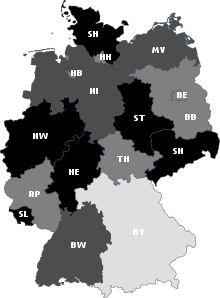
Representation of the CDU in the state parliaments unrepresented be in opposition as a minor coalition partner in the government as a major coalition partner in the government and provides the head of government
Search within the encyclopedia
















